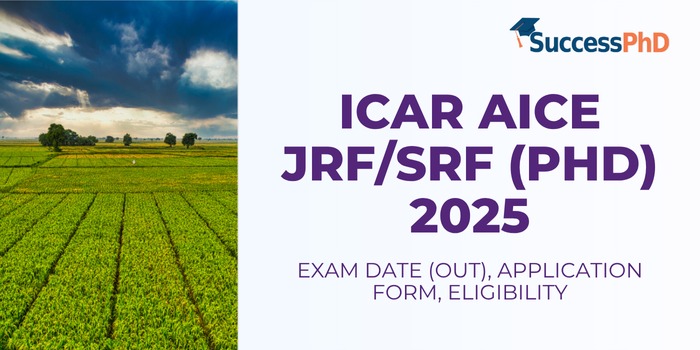NTA released ICAR AICE JRF/SRF (PhD) 2025 Notification for Admission to Doctoral Degree Program & Award of JRF/SRF (PhD), Apply now
ICAR AICE JRF/SRF (PhD) 2025 Registration Open
ICAR AICE JRF/SRF (PhD) 2025 – National Testing Agency (NTA) is the conducting body for ICAR All India Competitive Examination (AICE JRF/SRF (PhD)) 2025 on behalf of Indian Council of Agricultural Research (ICAR). ICAR AICE JRF/SRF (PhD) 2025 is conducted annually for Admission to Doctoral Degree Program and Award of JRF/SRF (PhD) in Agriculture & Allied Sciences Courses. Interested and eligible candidates can submit their applications online through the official application facility within the stipulated timeline. Applicants are advised to carefully review the eligibility criteria and examination guidelines before applying.
ICAR AICE-JRF/SRF (PhD) Exam – An Overview
- Name of Exam: ICAR AICE-JRF/SRF (PhD)
- Full Form: Indian Council of Agricultural Research All India Competitive Examinations Junior Research Fellowship, Senior Research Fellowship (Doctor of Philosophy)
- Exam Conducting Body: National Testing Agency (NTA)
- Level of Exam: National Level
- Courses Offered: Doctoral degree programmes in AUs in different disciplines of Agriculture, Horticulture, Forestry, Veterinary, Animal Sciences, Agril. Eng., Community Science (erstwhile Home Science), Fisheries, Dairy Science and other Allied Sciences
- Type of Exam: Agriculture Entrance Exams
About NTA
- The Ministry of Education, Government of India (GOI), has established the National Testing Agency (NTA) as an independent autonomous and self-sustained premier testing organization under Society Registration Act, 1860 for conducting efficient, transparent and international standards tests in order to assess the competency of candidates for admissions to premier higher education institutions.
The Objectives of NTA, Inter-alia, include:
- To conduct efficient, transparent and international standard tests in order to assess the competency of candidates for admission.
- To undertake research on educational, professional and testing system to identify gaps in the knowledge systems and take steps for bridging them.
- To produce and disseminate information and research on education and professional development standards.
About ICAR
- The ICAR is the Apex Body for coordinating, guiding, and managing research and education in agriculture in the entire country under the aegis of Department of Agricultural Research and Education (DARE), Ministry of Agriculture and Farmers Welfare. Considering the importance of agricultural education, the UGC (1948) chaired by Dr. S. Radhakrishnan recommended the establishment of Rural Universities in the country. As a result, the first State Agricultural University (SAU) was established in 1960 at Pantnagar on the pattern of the Land Grant Colleges of the United States.
- The ICAR-AU System of India has 74 Agricultural Universities comprising 63 State Agricultural, Veterinary, Horticultural and Fisheries Universities (SAUs), 4 ICAR-DUs, viz. IARI, IVRI, NDRI and CIFE, 3 Central Agricultural Universities (CAU Imphal, Dr. RPCAU Pusa and RLBCAU Jhansi), 4 Central Universities (CU) having Faculty of Agriculture (BHU, AMU, Viswa Bharati and Nagaland University). The National Agricultural Research, Education and Extension System (NAREES) of India is one of the largest in the world, admitting more than 28000 students at UG level and over 17,500 students at Master’s and Doctoral level annually, in different disciplines of Agricultural and Allied Sciences.
- The NTA has been conducting All India Competitive Entrance Examinations for admission to Bachelor (UG), Masters (PG) & Ph.D. Courses in Agricultural Universities (AUs), and for awarding scholarships/fellowships, from 2019 onwards, as entrusted to it by Indian Council of Agricultural Research (ICAR), Department of Agricultural Research and Education (DARE), Ministry of Agriculture and Farmers Welfare.
All India Competitive Examination-(AICE)-JRF/SRF (Ph.D.) 2025
- ICAR JRF/SRF (Ph.D.)-2025 Exam will be conducted in 72 Subjects at 89 Cities (Annexure-I) all over the country enabling participation of a large number of candidates seeking admission to Doctoral Degree Programmes in AUs in different disciplines of Agriculture, Horticulture, Forestry, Veterinary, Animal Sciences, Agril. Eng., Community Science (erstwhile Home Science), Fisheries, Dairy Science and other allied sciences.
- Admissions to 30% seats [100% seats of Dr. RPCAU Pusa & RLBCAU, Jhansi and ICAR- Deemed to be University (DU), viz. ICAR-IVRI, IARI, CIFE and NDRI] will be granted under the ICAR-AU system.
- Further, not more than 40% candidates from any one state shall be admitted in any agricultural university/subject under a particular category.
- ICAR JRF/SRF (Ph.D.) shall be awarded to limited number of candidates based on merit in this exam as per their overall merit-rank and seat availability in different disciplines. The other candidates who are declared/notified as qualified for counseling will be eligible as per their merit rank and availability of seat for admission to Ph.D. degree programme, without fellowship, in the specific subject in the AUs. The above eligibility conditions will also apply to in-service candidates.
- Candidates declared eligible for registration and choice filling for counseling by ICAR will only be considered for allocation of subject and the Agricultural University.
- There is no provision of direct nomination for admission through ICAR in any Doctoral degree programme without qualifying in ICAR AICE-JRF/SRF (Ph.D.).
Seats Available for Admission
- Tentative number of seats available for admission through ICAR AICE-JRF/SRF(Ph.D.)-2025 in different Disciplines/Programs of relevant Agricultural Universities under ICAR-AU system for the academic session 2025-26 is given at Annexure-XXII. However, final number of seats will be displayed on ICAR website www.icar.org.in at the time of online counseling.
- During academic year 2024-25, total number of ICAR AIQ seats available for admission in different Ph.D. programs under ICAR AU system was 2258.
AICE JRF/SRF (PhD) 2025 Important Dates
- Online Submission of Application Form: 06th May to 05th June 2025 (Upto 05:00 PM)
- Last Date of Successful Transaction of Fee through Credit/Debit Card/Net-Banking/UPI: 05th June 2025 (Upto 11:50 PM)
- Correction in particulars of Application Form on website only (No corrections shall be allowed after 09.06.2025): 07th June to 09th June 2025
- Downloading of Admit Cards from NTA website: Will be announced later on NTA website
- Date of Examination: 03rd July 2025
- Duration of Examination: 120 minutes (2 hours)
- Timing of Examination: As indicated on Admit Card
- Centre, Date & Shift of Exam: As indicated on Admit Card
- Display of Attempted Question Paper & Provisional Answer Keys: Will be announced later on NTA website
- Declaration of Result on NTA website: Will be announced later on NTA website
- Schedule for Online Counselling: Will be announced by the ICAR on www.icar.org.in after the declaration of result
Eligibility Criteria for AICE JRF/SRF (PhD) 2025
- Candidates should make sure that they fulfill the eligibility norms set for AICE JRF/SRF (PhD), before submitting the online form.
General Eligibility Criteria to Appear in AICE-JRF/SRF (Ph.D.)-2025
- Indian nationals who have passed Master’s Degree programme with a minimum of Overall Grade Point Average (OGPA) as shown in Table 2 will be eligible. In other cases, where grade- points are not awarded and only marks are awarded, the candidate must have secured a minimum percent score as shown in the Table 2.
- Further, in case any degree from a particular college/university is not considered for admission by an Agricultural University on account of a particular college/university being derecognized by VCI/UGC, or due to any Court directives (present or future), ICAR will not be responsible for admitting students of that college/university in the Universities not willing to admit such candidates.
- The candidates having Bachelor’s degree with 3 years’ duration will not be considered for admission through ICAR AICE-JRF/SRF (Ph.D.)-2025 in AUs under ICAR-AU system except in few courses at IARI and NDRI for which the eligibility criteria of the concerned ICAR-DU, including admission of graduates having passed with 3 years’ degree, would prevail for admission.
- Equivalence of Degrees will be decided by the admitting university only, as per the UGC Public Notice No.F9-3/2016(CPP-II) dated 19th July, 2016.
Minimum OGPA/Marks in the Eligibility Exam required appearing in AICE JRF/SRF
| OGPA | Marks Secured | |||||||
| Categories/Scale | 10 point Scale | 9 point scale | 8 point scale | 7 point scale | 6 point scale | 5 point scale | 4 point scale | Percent (100 Point) |
| General, OBC (NCL) & UPS/EWS | 6.5 | 5.85 | 5.20 | 4.55 | 3.90 | 3.25 | 2.6 | 60 |
| SC/ST/PwBD/Third Gender | 5.50 | 4.95 | 4.40 | 3.85 | 3.30 | 2.75 | 2.2 | 50 |
Note:
- Where OGPA is awarded, equivalence between OGPA and % marks will not be acceptable.
- There will be no rounding-off of the OGPA/percentage of marks of qualifying examination while deciding the basic eligibility of any candidate for admission e.g. if a candidate obtains 49.99% marks in his/her qualifying examination, then it will not be rounded-off to 50%.
- Merely qualifying the examination will not guarantee JRF/SRF/Admission. It would be governed by rules and regulations of ICAR and concerned University.
- Candidate must ensure that he/she fulfills the eligibility requirements for the examination as well as admission as detailed in the Information Bulletin. Applying for AICE-JRF/SRF (Ph.D.)-2025, appearing in the Examination and qualifying the same does not necessarily mean acceptance of eligibility. The applicant for a particular Subject must satisfy the eligibility criterion as specified in this Information Bulletin (or its amendments/corrections).
- The candidate must complete the postgraduate degree in all respects and should have all the degree- completion requirements on 31.07.2025; failing which they will not be considered for admission and the award of fellowship. Please note that ICAR/University will NOT be held responsible for denial of admission to non-eligible candidates.
- The candidates who do not have the Degree/PDC, have to mandatorily produce a certificate from the Registrar of the concerned university specifically indicating that the candidate has fulfilled on 31.07.2025, all the requirements for the award of Masters’ degree including thesis submission and completion of viva-voce and his/her Final OGPA/Percentage of marks at the end of final semester/year.
- The candidates should note that the university may deny admission in case the PDC/Degree, completed by 31.07.2025 is not produced at the time of verification during online counseling. No correspondence shall be entertained by the Council in this regard.
Eligibility Qualifications at Master’s level
- In order to appear in AICE-JRF/SRF (Ph.D.)-2025 in the Subject of specialization, candidates must have completed a Master’s degree in one of the Subjects given in Table 3.
| Code No. | Subject of Specialization | Eligibility Qualifications@ for SAUs/CAUs, etc. and/or ICAR-DUs (Master’s Degree in) | Additional Eligibility Qualification at Bachelors level for IARI/NDRI |
| 01 | Genetics & Plant Breeding | Genetics and/or Plant Breeding. | IARI-B.Sc. (10+2+3 system) |
| 02 | Seed Science & Tech. | Seed Science & Technology. | IARI-B.Sc. (10+2+3 system) |
| 03 | Plant Genetic Resources | Plant Genetic Resources/Botany/Agricultural Botany. | IARI-B.Sc. (10+2+3 system) |
| 04 | Plant Pathology | Plant Pathology/Plant Protection with specialization in Plant Pathology. | IARI-B.Sc. (10+2+3 system) |
| 05 | Nematology | Nematology/Plant Protection with specialization in Nematology. | IARI-B.Sc. (10+2+3 system) |
| 06 | Entomology | Agricultural Entomology/Entomology/Plant Protection with specialization in Entomology. | IARI-B.Sc. (10+2+3 system) |
| 07 | Sericulture | Sericulture/Agricultural or Horticultural Entomology. | – |
| 08 | Biochemistry | Plant Biochemistry/Biochemistry. | IARI-B.Sc. (10+2+3 system) |
| 09 | Plant Physiology | Plant Physiology/Crop Physiology. | IARI-B.Sc. (10+2+3 system) |
| 10 | Molecular Biology & Biotechnology | Agricultural Biotechnology/Biotechnology/Molecular Biology & Biotechnology. | IARI-B.Sc. (10+2+3 system) |
| 11 | Microbiology | Agricultural Microbiology/Microbiology. | IARI-B.Sc. (10+2+3 system) |
| 12 | Vegetable Science | Vegetable Science/Olericulture/Horticulture with specialization in Vegetable Science. | – |
| 13 | Fruit Science | Fruit Science/Pomology/Horticulture with specialization in Fruit Science. | – |
| 14 | Floriculture & Landscaping | Floriculture & Landscaping/Floriculture & Landscape Architecture/Agriculture or Horticulture with specialization in Floriculture and Landscape Architecture. |
– |
| 15 | Plantation, Spices, Medicinal & Aromatic Crops | Spices, Plantation, Medicinal & Aromatic Plants/Agriculture or Horticulture with specialization in Spices/Plantation Crops /Medicinal and Aromatic Plants. |
– |
| 16 | Post-Harvest Mgt. | Post-harvest Technology/Post Harvest Mgt. with specialization in Horticultural Crops. | – |
| 17 | Animal Genetics & Breeding | Veterinary Science with specialization in Animal Genetics and Breeding. | – |
| 18 | Animal Nutrition | Veterinary Science with specialization in Animal Nutrition. | – |
| 19 | Livestock Production and Mgt. | Veterinary Science with specialization in Livestock Production Mgt. For NDRI Karnal only: M.Sc. (Dairying) Livestock Production & Mgt. /Animal Genetics & Breeding/Animal Nutrition/Animal Physiology/M.V.Sc. Livestock Production & Mgt. /M.V.Sc. Livestock Production Mgt. /M.Sc. Livestock Production Mgt. /M.V.Sc. Animal Sciences/Animal Production/M.Sc.(Ag.) Animal Husbandry/M.Sc. (Ag.) Animal Husbandry & Dairying | – |
| 20 | Livestock Products Technology | Veterinary Science with specialization in Livestock Products Technology. | – |
| 21 | Poultry Science | Veterinary Science with specialization in Poultry Science. | – |
| 22 | Veterinary Parasitology | Veterinary Science with specialization in Veterinary Parasitology. | – |
| 23 | Veterinary Public Health & Epidemiology | Veterinary Science with specialization in Veterinary Public Health/Vety. Public Health & Epidemiology/Vety. Epidemiology. | – |
| 24 | Veterinary Microbiology | Veterinary Science with specialization in Microbiology/Bacteriology/Virology/Immunology. | – |
| 25 | Veterinary Pathology | Veterinary Science with specialization in Veterinary Pathology. | – |
| 26 | Veterinary Medicine | Veterinary Science with specialization in Veterinary Medicine/Preventive Veterinary Medicine/Veterinary Clinical Medicine. | – |
| 27 | Veterinary Pharmacology & Toxicology | Veterinary Science with specialization in Veterinary Pharmacology and Toxicology /Veterinary Pharmacology. |
|
| 28 | Animal Reproduction, Gynaecology & Obstetrics | Veterinary Science with specialization in Vety. Gynaecology & Obstetrics/Animal Reproduction, Gynaecology & Obstetrics | – |
| 29 | Veterinary Surgery & Radiology | Veterinary Science with specialization in Veterinary Surgery & Radiology/Veterinary Surgery. |
– |
| 30 | Veterinary Anatomy | Veterinary Science with specialization in Veterinary Anatomy/Veterinary Anatomy & Histology. |
– |
| 31 | Veterinary Physiology | Veterinary Science with specialization in Veterinary Physiology. | – |
| 32 | Veterinary Biochemistry | Veterinary Sciences with specialization in Vety. Biochemistry. | – |
| 33 | Veterinary Biotechnology | Veterinary Sciences with specialization in Animal Biotechnology. | – |
| 34 | Dairy Chemistry | For SAUs/CAUs, etc. Dairy Chemistry/Veterinary/Animal Sciences with specialization in Dairy Chemistry For NDRI only Dairy Chemistry/Veterinary /Animal Sciences with specialization in Livestock Products Technology/Chemistry. |
NDRI-B.Sc. (10+2+3 system) |
| 35 | Food Processing Technology* | Food Science/Food Technology/Food Science and Technology/Post Harvest Technology. |
– |
| 36 | Dairy Microbiology | For SAUs/CAUs, etc. Dairy Microbiology/Veterinary/Animal Sciences with specialization in Dairy Microbiology. For NDRI only Dairy Microbiology/Veterinary/Animal Sciences with specialization in Dairying /Microbiology/Biotechnology/Medical Microbiology/Industrial Microbiology/Food Safety and Quality Assurance. |
NDRI-B.Sc. (10+2+3 system) |
| 37 | Dairy Technology | For SAUs/CAUs, etc. Dairy Technology /Dairy Science/Dairy Eng./Livestock Products Technology/Food Technology with specialization in Dairy Technology. For NDRI only Dairy Technology/Dairy Engg./Livestock Products Technology/Food Technology with specialization in Dairy Technology. Candidates must have 4 years B.Tech. degree. |
– |
| 38 | Dairy Eng. | For SAUs/CAUs, etc. M. Tech. (Dairy Eng./Dairy Technology). For NDRI only M. Tech./M.E. (Dairy Eng./Dairy Technology/Agriculture Process & Food Eng./Chemical Eng./Dairy& Food Eng./Electrical Eng./Mechanical Eng./Electronics and Communication Engg./Post-Harvest Process & Food Eng./Food Technology.) Candidates must have 4 years B. Tech./B.E. degree. |
– |
| 39 | Farm Machinery and Power Eng. | Agricultural Eng./Mechanical Eng. with specialization in Farm Machinery and Power/Renewable Energy. |
– |
| 40 | Soil and Water Conservation Eng. | Agricultural Eng. with specialization in Soil and Water/Soil and Water Conservation/Civil Eng. /Irrigation a n d Drainage Eng./Water Resources/Water Science and Technology. |
– |
| 41 | Processing and Food Eng. | Agricultural Eng. with specialization in Agricultural Processing Eng./Processing and Food Eng./Food Process Eng./Dairy Eng./Post Harvest Technology (with specialization in Post – Harvest Eng. and Technology)/Renewal Energy Eng. | – |
| 42 | Renewable Energy Eng. | Agricultural Eng. with specialization in Renewable Energy/Farm Machinery and Power Engg./Processing & Food Engg. | – |
| 43 | Irrigation & Drainage Eng. | Agricultural Eng. with specialization in Soil and Water/Soil and Water Conservation/Irrigation and Drainage/Hydrology/Water Resources/Water Science and Technology. | – |
| 44 | Resource Mgt. and Consumer Science | Home Science with specialization in Family Resource Mgt. | – |
| 45 | Apparel and Textiles Science | Home Science with specialization in Clothing and Textiles/Textiles and Apparel Designing. |
– |
| 46 | Human Development and Family Studies | Home Science with specialization in Child Development/Human Development and Family Studies | – |
| 47 | Food and Nutrition | Home Science with specialization in Food Science and Nutrition | – |
| 48 | Extension Education and Communication Mgt. | Home Science with specialization in Home Science Extension/Home Science Extension and Community Mgt. | – |
| 49 | Fisheries Resource Mgt. | M.F.Sc. with specialization in Fisheries Resources (and) Mgt. /Fishery Biology. | – |
| 50 | Fish Processing Technology | M.F.Sc. with specialization in Fish Processing Technology/Harvest & Post-Harvest Technology. | – |
| 51 | Fishing Technology & Eng. | M.F.Sc. with specialization in Fisheries Eng./Fisheries Eng. (and) Technology/Fishing Technology and Fisheries Eng./Harvest & Post- Harvest Technology. | – |
| 52 | Aquatic Environmental Mgt. | M.F.Sc. with specialization in Aquatic Environment Mgt. | – |
| 53 | Aquaculture | M.F.Sc. with specialization in Aquaculture/Inland Aquaculture/Mariculture. | – |
| 54 | Aquatic Animal Health Mgt. | M.F.Sc. with specialization in Aquatic Animal Health/Aquatic Animal Health Mgt. /Fish Pathology and Health Mgt. /Fisheries Microbiology/Fish Pathology & Microbiology. | – |
| 55 | Fish Nutrition and Feed Technology | M.F.Sc. with specialization in Fish Nutrition Feed Tech/Fish Nutrition and Feed Tech/Fish Nutrition & Biochemistry. | – |
| 56 | Fish Genetics and Breeding | M.F.Sc. with specialization in Fish Genetics & Breeding. | – |
| 57 | Fish Biotechnology | M.F.Sc. with specialization in Fish Biotechnology/Fisheries Biotechnology. | – |
| 58 | Fish Physiology and Biochemistry | M.F.Sc. with specialization in Fish Physiology and Biochemistry/Fish Nutrition and Biochemistry. | – |
| 59 | Forestry** | Forestry/Agroforestry/Agronomy/ Horticulture with specialization in Agroforestry. |
– |
| 60 | Agricultural Meteorology | Agricultural Meteorology/Agricultural Physics with specialization Agricultural Meteorology. | – |
| 61 | Agricultural Physics | Agricultural Physics/Physics/Bio- physics/Agricultural Meteorology/Soil Science/Environmental Science/ Remote Sensing/Geo-informatics. |
IARI-B.Sc. (10+2+3 system) |
| 62 | Agronomy | Agriculture with specialization in Agronomy/Soil Water Mgt. / Forage Production/Water Science & Tech. | – |
| 63 | Soil Science | Agriculture/Horticulture with specialization in Soil Sciences/Soil Science & Agricultural Chemistry/Agricultural Physics with specialization in Soil Physics and Soil and Water Conservation/Water Science & Tech. | IARI-B.Sc. (10+2+3 system) |
| 64 | Agricultural Chemicals | Agricultural Chemicals/Chemistry. | IARI-B.Sc. (10+2+3 system) |
| 65 | Agricultural Economics*** | Agricultural Economics/Dairy/Animal Husbandry Economics/Veterinary Economics/Fisheries Economics. | – |
| 66 | Agri-Business Mgt. | Agribusiness Mgt. /Agricultural Marketing & Co-operation/Agricultural Economics/Business Mgt. with specialization in Agriculture. | – |
| 67 | Agricultural Extension Education@ **** | Agricultural Extension/Extension Education/Communication/Veterinary Extension/Dairy Extension/Fisheries Extension. |
– |
| 68 | Agricultural Statistics | Agricultural Statistics/Statistics/Biostatistics/Mathematical Statistics/Applied Statistics. | IARI-B.Sc. (10+2+3 system) |
| 69 | Bioinformatics | Bioinformatics/Molecular Biology/Biotechnology/Computer Sci. /Com. Application/Agri-informatics/Agricultural Statistics/Statistics/Mathematical Statistics/Biostatistics with Bioinformatics as a subject. |
IARI-B.Sc. (10+2+3 system) |
| 70 | Computer Applications | Computer Science/Computer Application/Information Technology/Post-graduate degree in any specialization of Computer Science. | IARI-B.Sc. (10+2+3 system). |
| 71 | Environmental Sciences | Environmental Science/Agroforestry/Agriculture/Forestry with specialization in Environmental Science. | |
| 72 | Water Science & Technology | Agriculture with specialization in Water science and Technology/Agronomy/Soil Science/Agricultural Eng. with specialization in Soil and Water Conservation Eng./Soil and Water Eng./Irrigation and Drainage Eng./Water Resources Eng./Water Resources Mgt. |
- For admission in State Veterinary universities/Veterinary colleges, only the candidates with BVSc& AH and M.V.Sc. (Vety. & A.H. Extension) shall be eligible.
Note:
- The Candidate must fulfill the eligibility conditions as indicated above. They are generally eligible for pursuing Doctoral degree in the subject in which they have passed their post-graduation.
- For certain subjects/courses, the universities may have different/additional eligibility conditions/criteria than those listed above. It is the responsibility of the candidate to check his/her eligibility with the concerned university at the time of counseling.
- For admission to Ph.D. degree programmes through the entrance examination, only the candidates having passed graduation with 10+2+4 [B.Sc. Ag. (Hons.) / B.Tech. / BFSc] or 10+2+5/5½ (B.V.Sc. & A.H.) or 10+6 (BSc. Ag.) years degree programme and post- graduation from any public funded/Govt. institution will be eligible. In addition to this, 2 years’ PG degree with thesis work is the essential requirements for admission to doctoral degree programmes in the AUs.
- The candidates having passed with 3 years’ UG degree programme are not eligible for Ph.D. admission through AICE-JRF/SRF (Ph.D.)-2025, except in few courses specified above at IARI and NDRI only.
- The candidates who have passed with 5 years’ integrated M.Sc. degree programme are not eligible to seek admission to Ph.D. degree programmes through this examination.
- Equivalence of Degrees will be decided by the admitting university only, as per the UGC Public Notice No.F9-3/2016(CPP-II) dated 19th July, 2016.
Age Limit
- Indian Nationals of at least 20 years of age as on 31.08.2025 are eligible to apply for the examination. No relaxation is permissible regarding the minimum age limit
Fellowship
- The amount of fellowship will be at the rate of Rs.31,000/- per month for the 1st and 2nd years (JRF) and Rs.35,000/- per month for the 3rd year (SRF). Contingent grant of Rs.10,000/- per year for procurement of essential chemicals, books, and travel connected with research work will be uniformly paid to all the awardees including in-service candidates.
ICAR AICE JRF/SRF (PhD) 2025 Application Process – How to Apply?
- NTA is the examination conducting body and its scope is limited to conducting the examination and declaration of the Result /Merit List as per the criteria prescribed. Candidates must note that they shall be bound by the conditions as laid down in this Information Bulletin as well as the and the Statutes, Ordinances, Notifications, Rules, Regulations and Guidelines of the admitting University / Deemed University / Institute, issued from time to time. It is the sole responsibility of the candidate to ensure that he/she fulfills the specified eligibility in toto before filling up the online application form and appearing in the examination.
Applying Online & Submission of Application Form
- The online submission of Application Form for AICE-JRF/SRF (Ph.D.)-2025, uploading of scanned photograph and signatures may be made at website www.nta.ac.in, https://exams.nta.ac.in/ICAR/
- The candidates should complete all the required details while filling up the online form. On submission of details and required fee, a Confirmation Page with Application Number shall be generated. Candidates are required to take a printout of the Confirmation Page and keep it for reference.
- In order to appear in AICE-JRF/SRF (Ph.D.)-2025, the candidates are required to apply online as per procedure detailed below.
- Before filling and submitting the online form, candidates should download the Information Bulletin and Replica of Application Form; and read them carefully. Candidates must follow the instructions strictly as given in the Information Bulletin and on the NTA website. Application Forms not complying with the instructions are liable to be rejected.
Replica of the Application Form
- The Replica of the AICE-JRF/SRF (Ph.D.) – 2025 Application Form is available at Annexure-VI.
Three Steps to Apply
- Application Form may be submitted in three simple steps:
- Step 1 – Apply for Online Registration using unique Email ID and Mobile No.
- Step 2 – Fill in the Online Application Form and note down the system generated Application No. Upload scanned images of Candidate’s Photograph (file size: 10 kb – 200 kb) Candidate’s Signature (file size: 4kb – 30kb) and candidate’s thumb Impression (between 3 kb to 30 kb) in JPG format.
- Step 3 – Pay fee using SBI/ICICI Bank Payment Gateway through Debit Card/ Credit Card/ Net-Banking/ UPI (Annexure-V) and keep proof of fee paid. In case the Confirmation Page is not generated after payment of fee then the transaction is cancelled, and amount will be refunded to the candidate’s account. However, the candidate has to make another transaction, in case the Confirmation Page is not generated.
Note
- The final submission of the Online Application Form will remain incomplete if Step-2 and Step-3 are not completed. Such forms will stand rejected and no correspondence on this account will be entertained.
- No request for refund of fee once remitted by the candidate will be entertained by NTA under any circumstances.
- There is no provision to upload any certificate/marks sheet etc., with the application.
- The entire application process is online. Therefore, candidates are not required to send/submit any document(s) including Confirmation Page to NTA/ICAR through Post/ Fax/E-mail/By Hand.
ICAR AICE JRF/SRF (PhD) 2025 Application Fee
- Application Fee Payable by the Candidates of Various Categories:
| General/Unreserved | Rs.2000/- |
| OBC-NCL*/ UPS**/EWS*** | Rs.1955/- |
| SC/ ST/ PwBD / Third Gender | Rs.1025/- |
| Applicable Service/Processing charges & GST are to be paid by the candidate. | |
- Other Backward Classes-Non Creamy Layer as per the central list of Other Backward Classes available on National Commission for Backward Classes (NCBC), Govt. of India website www.ncbc.nic.in. Only the candidates falling in this list may mention OBC in the Category Column. State list OBC candidates who are not in OBC-NCL (Central List) must not choose OBC (NCL).
- Candidates of Remote and Underprivileged States must check their eligibility.
Method of Fee Payment
- After completing Step 2 of Online Application Form, candidates may remit the examination fee (Step 3) by choosing the following options:
- Through Debit/ Credit Card – Candidates need to check the validity of the Debit/ Credit Card, while logging on to the website for submitting Application Form. Candidates should enter the information asked for and make the required payment through Debit/Credit Card.
- Through Net Banking – Check the balance in account and keep all credentials ready while logging on to the website for submitting the Application Form. Candidate should Login with his/her credentials of net banking and make payment through Net Banking.
- Through UPI – In case, the fee payment status is not ‘OK’ the candidates are advised as following:
- If the fee is paid through credit/ debit card and status is not OK, it means the transaction is cancelled. Therefore, such candidates have to pay the fee once again and ensure the OK fee status.
- For cancelled transactions, the amount will, automatically, be refunded to the concerned credit/debit card within 15 days of last date of submission of Application Form.
- Generation of Confirmation Page confirms the final submission of Application Form. If the Confirmation Page has not been generated, this means that the Application Form has not been submitted successfully.
Documents Required to Apply for ICAR JRF/SRF 2025
- Candidates MUST bring the following documents on the day of examination at the test centre. Candidates who will not bring these will not be allowed to appear in the examination.
- Print copy of Admit Card downloaded from NTA website
- One passport size photograph (same as uploaded on the Online Application Form) for pasting on the specific space in the attendance sheet at the Centre during the Examination
- Any one of the authorized Govt photo IDs (original, valid and non-expired), viz. PAN card/ Driving License/ Voter ID/ Passport/ Aadhaar Card (With photograph)/ Aadhaar Enrolment No/ Ration Card
- PwBD certificate issued by the Competent Authority, if claiming the relaxation under PwBD category
- A valid debit/credit/net banking for Application fee payment.
ICAR AICE JRF/SRF (PhD) 2025 Admit Card
- The Admit Card is issued provisionally to the candidates, subject to their satisfying the eligibility conditions.
- The candidate has to download the Admit Card from the NTA website as specified in Schedule of AICE-JRF/SRF (Ph.D.) and appear for the Examination at the given Centre strictly as per the Date and Shift (Timing) indicated on the Admit Card.
- No candidate will be allowed to appear at the examination center, on Date and Timings other than that allotted to them in their Admit card.
- The candidates are advised to read the instructions on the Admit Card carefully and follow them during the conduct of the examination.
- In case of any discrepancy in the particulars of the candidate or his/her photograph and signatures shown in the Admit Card and Confirmation Page, the candidate may immediately approach the Help Line between 10:00 am and 5:00 pm.
- In such cases, candidates would appear in the examination with the already downloaded Admit Card. However, NTA will take necessary action to make corrections in the record later.
- The Exam City Centre, once opted, shall not be changed. The admit card will be uploaded on NTA website www.nta.ac.in, https://exams.nta.ac.in/ICAR/
- Please check the admit card carefully for your Roll No., Name, Subject, Date of Birth, Gender, Exam Centre Name, City, and Category, etc. In case of any problem related to Admit card, please contact the given helpline numbers between 10:00 am and 5:00 pm
ICAR AICE JRF/SRF (PhD) 2025 Exam Pattern
- The Test of AICE-JRF/SRF (PhD) will have a single Paper of 2 hours duration. Details of the Test are as given below:
- Mode of Examination: LAN Based CBT (Computer Based Test)
- Duration: 2 Hours
Number of Questions
- 120 (20 + 50 + 50)
- 20 – Part A (General knowledge/reasoning ability)
- 50 – Part B Core Group (refer Table-1) containing the specialized Subject opted by the candidate for Ph.D.
- 50 – Part C Specialized Subject opted by the candidate for Ph.D.
- Type of Questions: Multiple Choice with 4 Options
Maximum Marks
- 480 (80+200+200)
Scoring
- 4 marks for each correct response
- -1 mark for each incorrect response (negative scoring)
- 0 for non-attempt
Medium of Paper: English only
- Test would consist of three Sections
- Subtest/Section A – First 20 MCQs will be common to all the 72 specialized Subjects. The questions assess the level of the candidate’s awareness about the environment and its application to the society. The questions are based on general knowledge in the domain of Agriculture, Animal Husbandry, Dairying, Fisheries and Allied Sciences, etc. including current events and matters of everyday observation and experience.
- Subtest/Section B – 50 MCQs will be from the Core Group (refer Table 1) containing the specialized Subject opted by the candidate for pursuing Ph.D.
- Subtest/Section C – 50 MCQs will be from one of the specialized Subjects (Table 3) in Master’s Degree opted by the candidate for pursuing Ph.D.
Subjects for Examination
- Core Groups for Section-B of AICE-JRF/SRF (Ph.D.) Examination
| Core Group | Subjects for examination | |
| 01 Crop Sciences-I | ||
| 1.1 Genetics & Plant Breeding | ||
| 1.2 Seed Science & Technology | ||
| 1.3 Plant Genetic Resources | ||
| 02 Crop Sciences- II | ||
| 2.1 Plant Pathology | ||
| 2.2 Nematology | ||
| 2.3 Entomology | ||
| 2.4 Sericulture | ||
| 03 Crop Sciences- III | ||
| 3.1 Biochemistry | ||
| 3.2 Plant Physiology | ||
| 3.3 Molecular Biology & Biotechnology | ||
| 3.4 Microbiology | ||
| 04 Horticulture | ||
| 4.1 Vegetable Science | ||
| 4.2 Fruit Science | ||
| 4.3 Floriculture & Landscaping | ||
| 4.4 Plantation, Spices, Medicinal & Aromatic Crops | ||
| 4.5 Post Harvest Management | ||
| 05 Veterinary and Animal Sciences-I | ||
| 5.1 Animal Genetics & Breeding | ||
| 5.2 Animal Nutrition | ||
| 5.3 Livestock Production Management | ||
| 5.4 Livestock Products Technology | ||
| 5.5 Poultry Science | ||
| 06 Veterinary and Animal Sciences-II | ||
| 6.1 Veterinary Parasitology | ||
| 6.2 Veterinary Public Health & Epidemiology | ||
| 6.3 Veterinary Microbiology | ||
| 6.4 Veterinary Pathology | ||
| 07 Veterinary and Animal Sciences-III | ||
| 7.1 Veterinary Medicine | ||
| 7.2 Veterinary Pharmacology & Toxicology | ||
| 7.3 Animal Reproduction, Gynaecology & Obstetrics | ||
| 7.4 Veterinary Surgery & Radiology | ||
| 7.5 Veterinary Anatomy | ||
| 08 Veterinary and Animal Sciences-IV | ||
| 8.1 Veterinary Physiology | ||
| 8.2 Veterinary Biochemistry | ||
| 8.3 Veterinary Biotechnology | ||
| 09 Dairy Science, Dairy Technology & Food Technology | ||
| 9.1 Dairy Chemistry | ||
| 9.2 Food Processing Technology* | ||
| 9.3 Dairy Microbiology | ||
| 9.4 Dairy Technology | ||
| 9.5 Dairy Engineering | ||
| 10 Agricultural Engineering and Technology | ||
| 10.1 Farm Machinery and Power Engineering | ||
| 10.2 Soil and Water Conservation Engineering | ||
| 10.3 Processing and Food Engineering | ||
| 10.4 Renewable Energy Engineering | ||
| 10.5 Irrigation & Drainage Engineering | ||
| 11 Community Science (Formerly Home Science) | ||
| 11.1 Resource Management and Consumer Science | ||
| 11.2 Apparel and Textiles Science | ||
| 11.3 Human Development and Family Studies | ||
| 11.4 Food and Nutrition | ||
| 11.5 Extension Education and Community Management | ||
| 12 Fishery Science-I | ||
| 12.1 Fisheries Resource Management | ||
| 12.2 Fish Processing Technology | ||
| 12.3 Fishing Technology & Engineering | ||
| 12.4. Aquatic Environmental Management | ||
| 13 Fishery Science-II | ||
| 13.1 Aquaculture | ||
| 13.2 Aquatic Animal Health Management | ||
| 13.3 Fish Nutrition and Feed Technology | ||
| 14 Fishery Sciences-III | ||
| 14.1 Fish Genetics and Breeding | ||
| 14.2 Fish Biotechnology | ||
| 14.3 Fish Physiology and Biochemistry | ||
| 15 Natural Resource Management – I | ||
| 15.1 Forestry** | ||
| 15.2 Agricultural Meteorology | ||
| 15.3 Agricultural Physics | ||
| 15.4 Environmental Science | ||
| 16 Natural Resource Management – II | ||
| 16.1 Agronomy | ||
| 16.2 Soil Sciences | ||
| 16.3 Agricultural Chemicals | ||
| 16.4 Water Science & Technology | ||
| 17 Agricultural Economics & Agri-Business Management | ||
| 17.1 Agricultural Economics*** | ||
| 17.2 Agri-business Management | ||
| 18 Agricultural Extension | ||
| 18.1 Agricultural Extension Education**** | ||
| 19 Agricultural Statistics | ||
| 19.1 Agricultural Statistics | ||
| 19.2 Bioinformatics | ||
| 19.3 Computer Application | ||
ICAR AICE JRF/SRF (PhD) 2025 Exam Syllabus
- The Question Paper for the Test shall be based on the Syllabus of Subjects as prescribed by the ICAR, available at website https://icar.org.in/node/21053
Declaration of Result
- The NTA will display provisional Answer Keys of the questions along with the question papers attempted by the respective candidates on the NTA website www.nta.ac.in, https://exams.nta.ac.in/ICAR/ to provide an opportunity to the interested candidates to challenge the Answer Key (if any).
- The Answer Keys are likely to be displayed for two to three days.
- Overall Merit/Rank List will be prepared by ICAR separately for every major Subject. In the event of candidates getting equal marks in the Entrance Examination, relative/inter se Merit will be determined in the following order:
- the candidate scoring less negative marks will be rated higher in merit
- the candidate higher in age would be rated higher in merit
- the candidate with higher score in Bachelor’s/UG examination would be rated higher in merit
- The Result of the AICE-JRF/SRF (Ph.D.)-2025 will be displayed to the candidates on NTA website: https://exams.nta.ac.in/ICAR/, www.nta.ac.in.
- The result of the entrance examination would be available in terms of overall merit-rank obtained by the candidate declared eligible for registration and choice filling for counseling in his/her subject.
ICAR JRF/SRF Counselling 2025 Process
- Candidates can follow the below process for ICAR JRF/SRF counselling 2025 process:
- Step 1 – Registration: The candidates will have to register themselves on the official website if they wish to participate in the counselling process. They can do so by paying the registration fee, INR 800, online.
- Step 2 – Choice Filling: After the registration process is completed, a candidate will have to log on to the website and select the choice of specialization as well as the university that they are interested in based on the marks they have secured.
- Step 3 – Seat Allotment: Based on the preferred specialization, course, merit, and availability of seats, candidates will be notified via email on seat allotment.
- Step 4: Verification of Document – After the provisional admission letter has been downloaded, candidates will have to report to the university and submit the relevant documents. After the document has been verified, the candidate will receive their final admission letter
Exam Centres
- The ICAR AICE JRF/SRF (PhD) 2025 exam will be held in 89 cities across India. The specific exam centers will be determined by the exam conducting body, and candidates can expect to receive their allotted exam center city along with their admit card
- During the application process, candidates will be able to select their preferred cities, and the authorities will try to allocate them based on their choices.
For more details and to apply online, please visit the official website








Comments